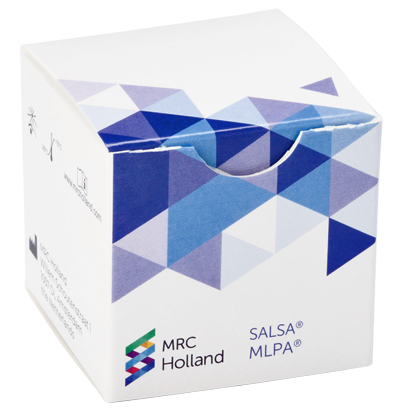Due to the presence of the highly similar PMS2CL pseudogene, the distinction between CNVs in PMS2 and PMS2CL is not always clear. However, to obtain as much information about the PMS2 region as possible using the MLPA technique, three different probe types with specific purposes are included in P008 PMS2:
- PMS2-specific probes that target 2 copies in healthy individuals (CN2 probes);
- PMS2/PMS2CL probes that target 4 copies in healthy individuals (CN4 probes);
- PMS2/PMS2CL SNV probe pairs that target both allelic forms of five SNVs present in either exons 11-15 of PMS2 or in the associated exons of PMS2CL.
PMS2-specific (CN2) probes
The PMS2-specific probes target regions throughout exons 1-11 of the PMS2 gene. Although PMS2 exons 9 and 11 share high homology with associated exons in PMS2CL, these probes are specific because they have been specifically designed to detect sequences that are only present in the PMS2 gene. Therefore, the final ratios (FRs) obtained from these probes are directly indicative of the copy number of exons 1-11 of the PMS2 gene.
Combined (CN4) probes for PMS2 and PMS2CL
The combined probes for PMS2 and PMS2CL target regions throughout exons 12-15 of the PMS2 gene and the associated exons in the PMS2CL pseudogene because the very high homology in this region makes design of specific probes impossible. Consequently, the FRs obtained from these probes combine information from the copy number status of both PMS2 and PMS2CL.
PMS2/PMS2CL SNV probe pairs
The PMS2/PMS2CL SNV probe pairs target both allelic forms of five SNVs present in either exons 11-15 of PMS2 or in the associated exons of PMS2CL. The distribution of these SNV alleles among PMS2 and PMS2CL varies. Therefore, the FR obtained from each of these probes correlates to the total number of PMS2 and PMS2CL copies presenting the SNV allele. In individuals without CNVs, the sum of the total number of copies resulting from both allele probes in the probe pair is expected to be 4 (2 alleles in PMS2 and 2 alleles in PMS2CL). This is valid for each probe pair.
Combining information from all probe types
In order to interpret results obtained with P008 PMS2, it may be necessary to combine information from all three probe types described above.
If an aberration is detected using the PMS2-specific (CN2) probes, information from the combined (CN4) probes for PMS2 and PMS2CL and the PMS2/PMS2CL SNV probe pairs can be used to determine the extent of the copy number change. Note that care should be taken if only the exon 11 PMS2-specific (CN2) probe shows an aberration, as gene conversion may occur between PMS2 and PMS2CL in this region.
If an aberration is detected that does not involve the PMS2-specific probes, MLPA alone cannot determine whether the copy number change is present in PMS2 or PMS2CL. Gene-specific long-range PCR and (next generation) sequencing analysis can help determine whether the copy number change is present in the gene or the pseudogene (Li et al. 2015, Vaughn et al. 2011).
Importantly, allocation of the copy number change to either PMS2 or PMS2CL will not be possible when all alleles of PMS2 and PMS2CL share the same variants targeted by the SNV-specific probes. In situations like these, family studies may aid in determining whether the copy number change is present in PMS2 or PMS2CL.

Please note that there are other methods to investigate whether copy number variations are present in PMS2 or PMS2CL, such as capture-NGS. Furthermore, it is important to note that gene conversions are known to occur between PMS2 and PMS2CL, which may involve additional exons and complicate interpretation.
Webinar part 2/3: How to use the different MLPA probes within P008 for PMS2 CNV result interpretation and detection in Lynch syndrome?
For more information pertaining to the use of other techniques to discriminate between PMS2 and PMS2CL, please consult the second part of the SALSA MLPA Probemix P008 PMS2 webinar: Part 2: How to use the different MLPA probes within P008 for PMS2 CNV result interpretation and detection in Lynch syndrome?
Please note: this webinar is the second part in a three-part series.






